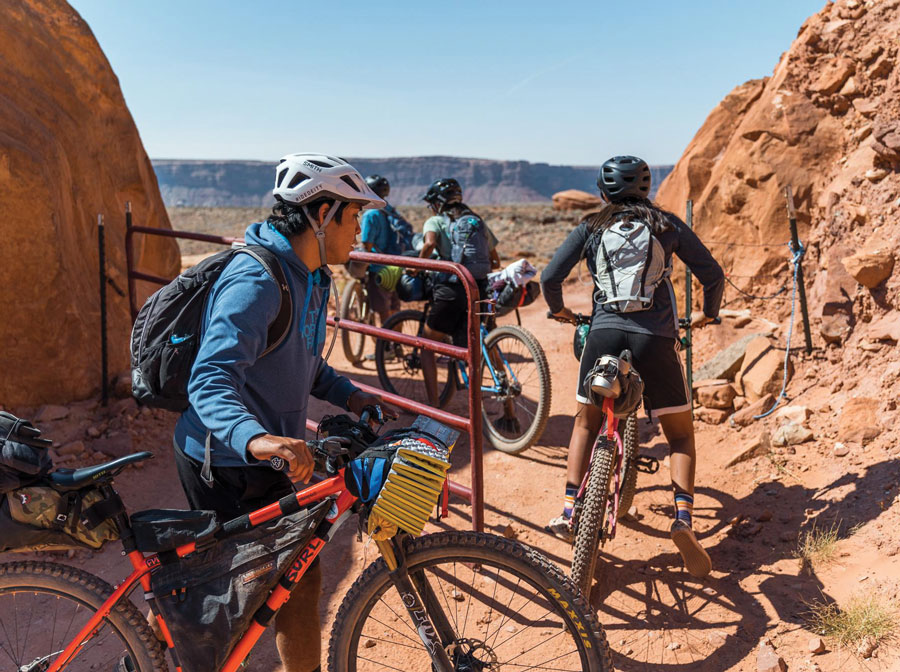When in Doubt, Pedal
This article first appeared in the February 2022 issue of Adventure Cyclist magazine.
On the Navajo Nation Reservation, there is a convergence of three cities: Kayenta, Dennehotso, and Chilchinbeto. Each town blooms with more than a millennium of history and ancestors of the people living there today. The community of people there have cultural relationships with the sagebrush, the striations in the plateaus, the mountains, the bugs and birds, the coyotes, and even the wind — connections to one another that are far deeper than just living in the same place. These relationships and traditions hold together a Tribal Nation, full of many different families, clans, and thus opinions. It is part of the reason we have survived and will continue to do so — an intricate reliance on one another and our ancestral connection to the soil on which we stand.
The Navajo peoples are no strangers to perseverance, to strength, and to lifting one another up. Stronger together takes a different meaning in a Tribal setting; the Navajo peoples were struck with extreme hardship in the last two years. Due to the exacerbated spread of COVID-19 on their reservation, the Navajo peoples created restrictions and strict guidelines to protect as many people as possible and prevent a continual spread of the virus. For many humans around the world, a deadly virus, and the protective guidelines that came with it, sprung from nowhere. Lives were altered with no warning, and Jon Yazzie was no exception. Just before the virus hit, with no knowledge of how much more important these trips were about to become, Yazzie had begun to create his bikepacking guide service on the Navajo Reservation.
Yazzie lives below the mountains in Kayenta, Arizona, and his relationship with his homelands is intricate. Yazzie’s plan was to create a service that can bring “cultural awareness through bikepacking,” teaching clients to pack bikes, make camping food, manage and filter water, and provide the gear to do so. Bikes have changed Yazzie’s life, and bikepacking has changed his perspective so much that he wanted to make this experience accessible to youth around the Navajo Nation. Even though the passion is there, it has not been a smooth process to begin DzilTa’ah Adventures.
“DzilTa’ah” is a Navajo word meaning “mountain base,” which aligns with the idea of bikepacking. While there’s no mountaineering or mountain climbing involved, it’s a way to explore the gravel paths and plateaus. Despite the community’s deep connection to the land and being present in the natural world, not everyone understands what the idea behind bikepacking is. Yazzie had many hoops to jump through. The tribal council, as well as grazing landowners and managers, didn’t understand cycling and had concerns about the impact bikes would have on the region. The fact is that many Native peoples, who have not had access to bikes, do not understand what it would mean to bring a bikepacking tour company to a rez. It doesn’t mean that Tribal councils and communities will never understand, but that there is an introduction period that is sensitive. As such, Yazzie has had to slowly bring bikes into his community, and thus the only tours he’s led have been with family and friends. He’s seen the impact even within his close relations. “As many times as we’ve been told ‘no’ or have wanted to give up and dissolve our company, I have to remember that we are still serving a purpose,” said Yazzie. “And that is, we are pioneering the process, helping amend tribal laws and cutting red tape that will make it easier for future native-owned outdoor companies to establish businesses on the reservation.”

Cyclists of all colors, shapes, and sizes understand the impact that bikes have had on our lives. The community bikes have brought, the physical health they have allowed, and the happiness they cultivate. There is a special relationship to movement, to self-pursuits and in the simple fact of having something to do and to be motivated for. As modern peoples, we are finding modern ways to connect to the land as our ancestors once did. In many ways, riding a bike reminds me of what it was like to grow up with horses — the relationship with the freedom of movement, the care you must give horses, and even the physicality is similar. A mentee of Yazzie’s, a young girl around 14, has done just this: she comes from a background of horseback riding and is now competing in bike racing. “She was one of our first participants and she’s been on probably five or six trips so far,” said Yazzie. “She never had ridden a bike and she didn’t own one, now she’s racing and competing. She races NICA and MBAA and she’s only 14 years old. This September would have been one year of riding; she took second place in the MBAA AZ XC State Championship after only four months of riding. She grew up riding horses so she really understands the mechanisms of riding.” It’s stories like this that show the impact that cycling can have on Indigenous youth, and DzilTa’ah Adventures is planning to do just that — impact the lives of Native youth and get them on the land.
The impact doesn’t end with learning to ride a bike and getting outside — the mental health of participants is severely affected in a positive way as well. Bikepacking has the ability to help youth feel independent and self-sufficient. Sean Goldooth, another participant and first-time Indigenous bikepacker, said, “Bikepacking is the cycle of life. Reconnecting with the land, animals, and the challenges the weather has to offer. Be strong with a good state of mind and keep moving forward. As long as the sun rises in the east and sets in the west, everything will be okay. Ride, sleep, and repeat.” There is a simplicity to life on a bike, a simple notion of dark means sleep, light means ride. Go means forward motion and stop means drink water and fuel up. The focus that one gets while riding on a bike, the simple existence, and the literal removal from the stresses of the world is something all youth need.
It is not just youth who benefit from an Indigenous-run bikepacking guide service. Bailey Newbrey, owner of Sincere Cycles in Santa Fe, New Mexico, is a respected bikepacker and ultra-endurance athlete. “DzilTa’ah Adventures offers truly unique opportunities and experiences through their guided tours,” Newbrey said. “Jon’s intimate knowledge of the land, its history, and his people’s creation stories make his guided tours an immensely immersive experience, which left me with a desire to learn more about both these amazing landscapes and the people who have called them home, from current Dine to the ancestral Puebloan.” To Newbrey, DzilTa’ah is a way to respect the land from Yazzie’s perspective as an original person, showing the care Native people have for our homelands and our intricate histories on these lands. Bikes can bring people from different cultures and perspectives together, and at the end of the trip someone like Newbrey can walk away from it knowing the history, the current love, and the importance of returning Native people to our homelands. Among Indigenous peoples, there is a term we often use: land back. It quite literally means to give the land that our ancestors have cared for back into our care. It doesn’t mean uproot everyone and kick people out of the U.S.; it means we know and love our homelands and we know how to care for them best. Something as simple as a bikepacking trip with Yazzie can show someone that. His knowledge passed from his grandmother comes through in his love for Navajo lands. If everyone could see that, then I believe everyone would be able to understand a bit more why it is so important to have our land back, to honor the treaties in the U.S. government that have not been honored, and to allow Native people to lead environmentalism, public land projects, and put forth our knowledge on how to help a land that is being impacted by extraction and climate change.
Bikes in all forms — small wheels, wooden, four wheels, mad genius contraptions to accelerate forward human motion — have been a part of human “progress” since the early 1800s. Progress, however, has been a weapon toward Indigenous peoples for a very long time, imposing a “right” way to be, from the Western clothing our ancestors were forced to wear to lifestyle changes to make them worthy of human rights. Indigenous hair was cut, families separated, and traditions shamed all in the name of human progress, and I struggle to celebrate this progress. I do not argue, however, that human invention, innovation, and creation are an undeniable right of our conscious minds, and the ability to invent new things and to add to the human experience is something positive. Bikes are a part of that progress of modern society, and the invention of the bike has brought liberation to many peoples. From women feeling more safe traveling from place to place on a bike, to children getting to school on time, bikes have provided the joy and safety of movement and the ease of doing so without environmental impact. To move on a bike is more than just exercise, it is a reminder of our own personal power, that we can move ourselves forward and that our presence on the land is beautiful and integral.
DzilTa’ah Adventures may be centered on bikepacking, but the ways that it centers Native peoples and Native lands goes beyond bikes — it serves the Navajo peoples and those who are willing to learn Indigenous ways of being on and respecting the land. There is no ownership, no ego, no conquer mentality. There is only history, compassion, and reciprocity. All outdoors people need a dash of that in their lives.
With the knowledge of how important these trips are, there is good news for DzilTa’ah Adventures. “After five years of what seemed like an uphill battle, we were finally granted permits for three routes to offer in 2022,” said Yazzie. “We have a total of nine in mind with six that still need beta-testing, but are excited to offer tours starting this spring and look forward to sharing stories and our homelands.”

